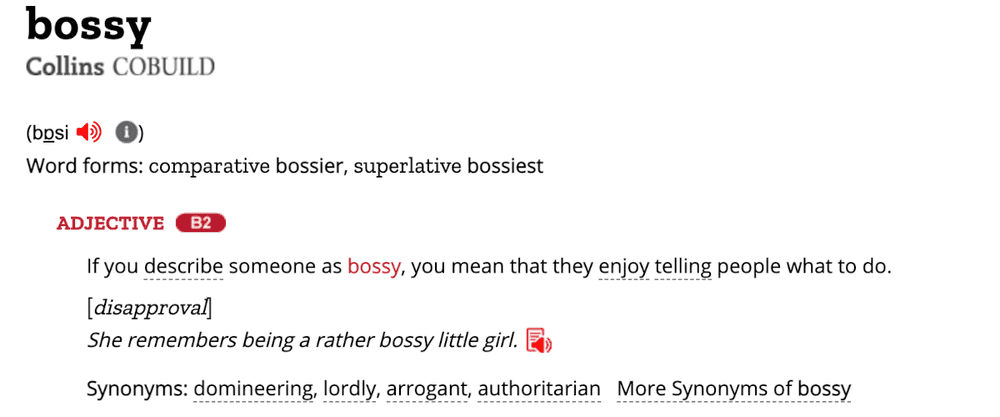
Little Miss Bossy

When I was four, my Mum went to my first parent-teacher meeting, where the teacher told her:
"Áine’s quite a bossy little girl. She likes to organise the other children, and tell them what they should be doing."
Said with a disapproving tone, and intimating that I was doing something wrong, my Mum asked back:
"Was I disrespectful? Disruptive? Unkind?"
The response:
"Oh, no! She’s a lovely child!"
My Mum then dismissed the earlier comment saying:
"As long as she respects you as her teacher and knows how to behave, I won’t be discouraging her in expressing herself in a confident and assured manner. She’ll have enough people trying to do that, and I certainly won’t be one of them."
Unfortunately, my Mum was right. Many people while I was growing up said that I could be quite bossy, and in doing so have set a tone that I should stop being so ambitious, headstrong, determined, and willing to lead.
According to the Collins English dictionary, to refer to someone as bossy, "you mean that they enjoy telling people what to do."

There’s nothing inherently wrong with this definition or statement, and so, why is it that the term bossy, when used in conversation, almost always means two things:
- You are referring to a woman or young girl
- You mean it in a negative way
We don’t very often hear little boys being referred to as bossy, but rather, confident, strong, a leader, able to take charge - all words with positive connotations.
Bossy or just the boss
Last Friday, as part of my latest 25@25 session, I had the pleasure of listening to Samantha Barry, Editor and Chief of Glamour magazine in the US, and a proud Cork woman.
Samantha talked in great detail about her career trajectory to date, from working for RTÉ, to covering the Hillary-Trump election campaign for CNN. She’s an inspirational person to listen to, and in my opinion, the definition of a boss.
It got me thinking however, whilst I certainly view her as a boss, I imagine others may view her as bossy, and is there really a difference between the two?
My opinion? Yes.
One single letter in a word turns the meaning on it’s head. You are no longer viewing a display of power or assurance in a negative light, but rather celebrating and encouraging it.
If words like this matter, and the language we use has such a big effect, then why in 2023 do we still hear young girls being called bossy? Why do I sometimes still get that inner voice saying, just be quiet this time or people will think you’re too demanding, too domineering, when in fact I have every right to express myself and my opinions as much as anyone else?
My oldest niece is six, and my family often say that she reminds them of me when I was that age. She’s kind, intelligent, caring and she knows what she wants (and certainly isn’t afraid to let you know!). Traits like that could very well get her the same labels I have had in my life.
I believe, however, that myself and other former Little Miss Bossies have a duty to work to ensure that she, and other little girls, don’t have the same negative experiences, and that they grow up believing and knowing that if they so choose, they can be a boss.